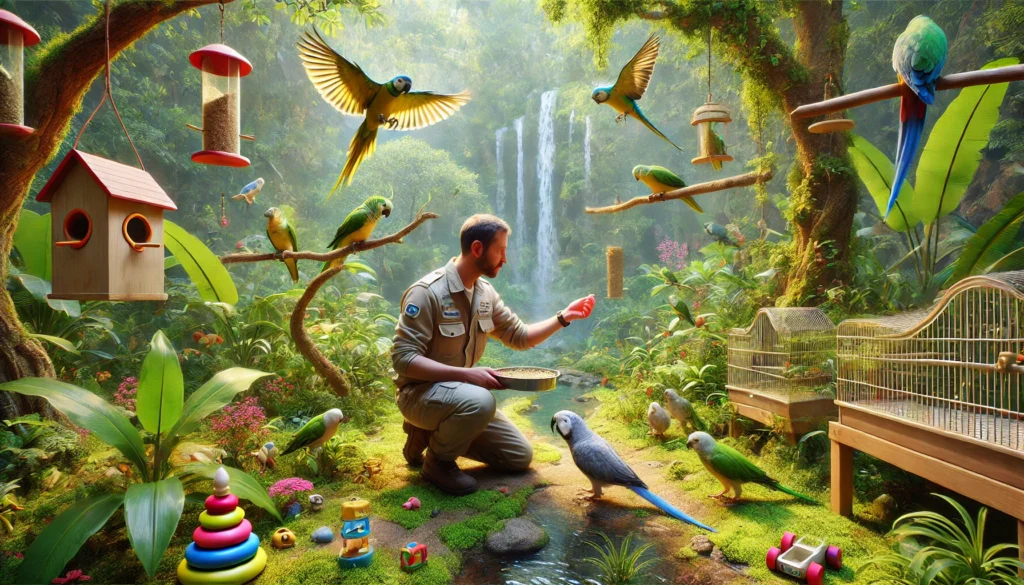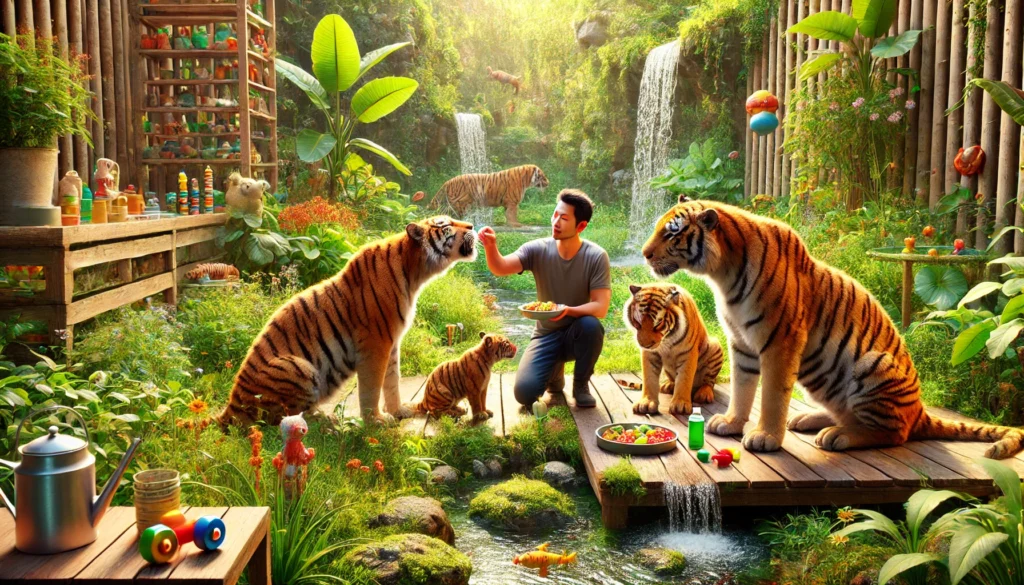Caring for a wild animal in captivity is a task that requires responsibility and dedication. The diet and nutrition of these animals are fundamental elements to guarantee their health and well-being. Imagine a scenario where the beauty of nature meets the serenity of home, providing a balanced and healthy life for your exotic companions. In this article, we will explore in detail the dietary needs of different species, from reptiles to birds, offering practical guidance and valuable insights for all wildlife caretakers.
The Importance of a Proper Diet
Correct nutrition is essential to keep wild animals in captivity healthy and active. Just like us, they need a balanced diet that meets their specific nutritional needs. An imbalance in nutrition can lead to health and behavioral problems and even premature death. Therefore, understanding the particularities of each species is crucial to providing a long and healthy life for our animal friends.
Reptile Nutritional Requirements
Reptiles have very specific dietary needs that vary depending on the species. Iguanas, for example, are herbivores and must consume a diet rich in green leafy vegetables, fruits and legumes. Snakes, being carnivorous, need a diet based on small mammals or birds. Supplementation with vitamins and minerals is also essential to avoid nutritional deficiencies common among reptiles in captivity.
Exotic Mammals: Diversified Diet
Exotic mammals, such as ferrets, require a diet rich in protein and fat, similar to the diet of wild carnivores. Fruits and vegetables can be offered in limited quantities, while lean meats and high-quality feed should form the basis of the diet. Food variation and enrichment are important to keep these animals mentally stimulated and physically healthy.
Birds: Balanced Nutrition for Healthy Flying
Birds, in turn, have a diet that varies significantly between species. Parrots, for example, require a combination of seeds, fresh fruits, vegetables and pellets formulated especially for birds. Birds of prey, such as hawks and owls, need a diet rich in protein, including fresh meat. The supply of calcium is vital for the bone health and reproduction of these birds in captivity.

Ornamental Fish: Special Feeding Care
Ornamental fish are often forgotten when talking about a specific diet. However, each species has different needs. Herbivorous fish must receive a diet rich in vegetables, while carnivorous fish require live or frozen foods, such as small crustaceans. Water quality and adequate nutrition are crucial to the longevity of fish in aquariums.
Insects and Invertebrates: Natural Food
Insects and invertebrates, such as spiders and scorpions, also have specific diets. Many of them feed on smaller insects, and supplementation with vitamins and minerals may be necessary to ensure a complete diet. Creating an environment that simulates the natural habitat of these animals contributes to their well-being in captivity.
Importance of Hydration and Supplementation
In addition to diet, hydration is a vital aspect of the health of wild animals in captivity. A constant supply of clean, fresh water is essential. In some cases, supplementation with vitamins and minerals is necessary to avoid nutritional deficiencies. This supplementation must be carried out under the guidance of a specialized veterinarian, ensuring that the specific needs of each species are met.
Environmental and Food Enrichment
Environmental and food enrichment is a practice that improves the quality of life of animals in captivity. Providing foods with different textures, shapes and presentation methods stimulates the animals' natural behavior, preventing boredom and promoting mental health. Toys, hiding places and climbing areas are examples of enrichment that can be introduced into the animals' environment.

Nutritional Disease Prevention
An inadequate diet can lead to the development of several nutritional diseases in wild animals in captivity. Among the most common are obesity, malnutrition and vitamin deficiencies. Regularly monitoring the body condition and health of animals, adjusting the diet as necessary, is essential for preventing these diseases. Regular consultations with a specialized veterinarian are also recommended.
Specific Cases: What to Consider
Each species of wild animal has particularities that must be considered when preparing the diet. Nocturnal animals, for example, may have different feeding schedules than daytime animals. Species with specific dietary needs, such as pandas, which feed almost exclusively on bamboo, require extra attention to ensure that all necessary nutrients are supplied.
Impact of Captivity on Food
Captivity can significantly impact the eating habits of wild animals. The lack of natural stimuli can lead to inappropriate eating behaviors, such as rejecting certain foods or overeating others. Creating an environment that simulates the natural habitat and providing a varied diet are effective strategies to minimize these impacts.
Challenges and Solutions in Captive Feeding
Feeding wild animals in captivity presents several challenges. The availability of fresh and appropriate foods may be limited, and the need for nutritional supplementation is constant. Looking for reliable suppliers, establishing a detailed meal plan and adapting the diet as necessary are solutions that help overcome these challenges.
Caregiver Awareness and Education
Caregiver education is crucial to ensure adequate nutrition for wild animals in captivity. Courses, lectures and educational materials can provide valuable information about the specific nutritional needs of each species. Furthermore, the exchange of experiences between caregivers and specialists can enrich knowledge and improve feeding practices.
Final Considerations on Feeding Wild Animals in Captivity
Finally, feeding wild animals in captivity is a complex area that requires specialized knowledge and dedication. Each species has its own particularities, and offering a balanced and varied diet is essential to guarantee the health and well-being of these animals.
Awareness and education of caregivers are fundamental to the success of this task. Therefore, investing in adequate information and practices is key to providing a long and healthy life for our exotic companions.
